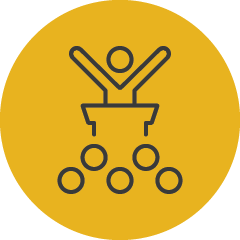
Opinions expressed in AGB blogs are those of the authors and not necessarily those of the institutions that employ them or of AGB.
It is ironic or perhaps well-timed that AGB is hosting this year’s Board Professionals Conference in Chicago—one of the great “epicenter” cities of the country. “Epicenter” is symbolic of who we are as board professionals. In each of our campus communities, we are at the epicenter of a world now defined by sudden, shifting mandates and daily pronouncements that generate consequential impacts on every aspect of higher education.
Perhaps you might not think of yourself as sitting at the epicenter of your institution. But consider the following:
- Other than your president, who else is investing time with every department, division, area, or office of the institution, whether formally or informally, to learn of the ongoing work of their colleagues in furtherance of the institution’s mission?
- If you are with a foundation, who other than the chief executive engages as regularly with campus leaders, committee staff, donors, and other constituents?
- Who is considering how to best convert what they are learning about such work into topics, issues, and questions that your governing board and administrative leadership should take on?
- Who, other than your president and foundation chief executive, has a bird’s eye view into the general sense of the governing board in this time of complex challenges?
- Who can link the myriad of work across parts of the institution to the mission and values of the institution?
- Who is thinking—probably constantly—about how to ensure that the governing board and the administrative leadership are working collaboratively and communicating meaningfully in this time of complex challenges?
- Who is ensuring that whether it is the governing board or the administrative leaders, each has the information they need, the framing and context of that information, and the right issues (together with the right questions) so that everyone does their best work in this time of complex challenges?
It is you—the “epicentered” board professional.
Being at an epicenter in times of change and upheaval requires the power of great insight. And the best spot to learn, practice, exercise, and leverage the power of great insight is the Board Professionals Conference in Chicago (March 29-31). This is why I am packing my bags for Chicago.
Board Professional: Wearer of Many Hats
Let us put a point on our “epicentral” role. Scan this checklist. It identifies the many roles that we have taken on in the last decade. Ask yourself not only whether these roles place you at the epicenter of your institution, and equally important, whether you are at the peak of your professional powers in each of these roles. Polishing your skills in these roles will help exercise the power of great insight:
- A planner and manager of consequential board meetings;
- A “true partner in governance” through framing and resolving governance and policy issues;
- A candid sounding board for the president/chief executive and senior leadership about strategic issues facing the board;
- An “alignment tester” to assess alignment between the board’s and the president’s/chief executive’s priorities;
- An information facilitator for the board regarding the institution’s or foundation’s handling of issues, especially during a crisis;
- A trusted confidant whose impartiality, judgment, regard for sensitive information, and discretion are deeply respected by board leadership, board members, the president or chief executive, and other senior leadership;
- A relationship manager between senior leadership and board members;
- A professional highly attuned to strategic issues—academic, administrative, student-facing, financial, political, and so forth—confronting your institution AND the higher ed ecosystem, including an uncanny ability to see the issues just “around the corner”;
- A skilled communicator of key institutional accomplishments and events;
- A protector of the institution/foundation—especially its mission and priorities;
- An “instructor” to board members to help them understand and hone their fiduciary duties and responsibilities, as well as their expectations (and limitations) in support of a healthy, inclusive board culture and good governance;
- A partner to assist the board to assess its effectiveness in the performance of its work; and, as a tip of the hat to the past, do not forget …
- A meeting scribe and handler of board correspondence.
These times of great challenge test our talents and skills. But it is through this conference and our time together that we can share our knowledge and experience in furtherance of the great insight we need to be consequential board professionals.
Using the AGB Conference to Leverage Institutional Excellence
Many of you know I arrived at my board professional role through a somewhat different path than others. For 10 years, I was a trustee on the same board I work with today—seven as board vice chair. This has no doubt helped leverage the kinds of relationships with the board, the president of my institution, and my senior leadership colleagues that we value as board professionals. It has also helped me understand how and where our work can add value to the efforts of the board, the president, and senior leadership. On top of this, I also serve as general counsel to my institution, which requires my involvement in some of the most sensitive issues and topics facing the board and the institution.
As I noted in a blog post urging you to attend last year’s conference in Boston, my personal view is that as a board professional, my job is to help and support our board, our president, and our senior leadership to do their best and most consequential work in fulfillment of the mission of our institution.
Given this perspective, I believe this means we must:
- Be our best, most authentic selves in the performance of our work;
- Use our position to ensure our board as a whole, and our members individually, are their best selves in the performance of their work; and
- Support the president and our colleagues throughout the institution so they can do their best work.
I am preparing for the upcoming Board Professionals Conference by categorizing the issues and topics that will be featured. I then plan my attendance at sessions and activities that will help me position my institution and my board for success. For each of us, the issues and topics we prioritize are likely to be different. But take a look at this year’s list of issues and topics:
- Developing great board culture including board engagement, inclusion, and sense of belonging;
- Our roles in times of crisis;
- The challenge of institutional leadership succession;
- Collaborating with your general counsel;
- Fostering consequential (and great) governance—at the board and in your institution;
- Undertaking some of the fundamental issues facing a board professional—Roberts Rules, connections with former board members, the “science” of consequential board and committee work and meetings, the use of artificial intelligence;
- “Lessons learned the hard way”;
- Understanding and taking on the top strategic issues facing higher education in 2024–2025;
- Coping in an environment of transition, shifting ground, and significant change—planned or unplanned; and
- Assessing board performance and structure and fundamental building blocks of effective boards.
Polishing our skills and enhancing our knowledge toolboxes through the various presentations, tips, and best practices our colleagues will share on these topics are effective ways to think about how to get the most from the conference.
Conference Dividends and Takeaways
Of course, none of the learning, experience-sharing, knowledge-building, skill-polishing, and engaging in consequential work at our conference occurs in a vacuum. In fact, we could not be our best selves without each other’s company. As noted by Charlene K. Reed in The Role of the Board Professional, our role can be solitary and lonely at times. Few of us are blessed with robust levels of support staff to whom we can turn to talk about issues and topics requiring sensitivity, impartiality, objectivity, and confidentiality. This is especially true in the dual role of board professional/general counsel.
So, for me, a major dividend of this conference is the opportunity to be with colleagues as we learn and share perspectives in one another’s company. It is also why I invest time in various AGB webinars and other online discussions offering the opportunity to learn from the best and brightest in our profession as they share their successful (and unsuccessful) practices, takeaways, and tips.
In closing, none of us are born as naturally effective board professionals. Instead, we develop our skills and do our best work in our various roles through the time we invest to develop our better selves. The Board Professionals Conference is a preeminent resource to help us be at our best. I hope you will find the time to avail yourselves of the opportunities the conference will provide. Please be sure to stop and say hello, and I look forward to seeing you there.
Richard Uchida is vice president, general counsel, and secretary of the college at Colby College.



